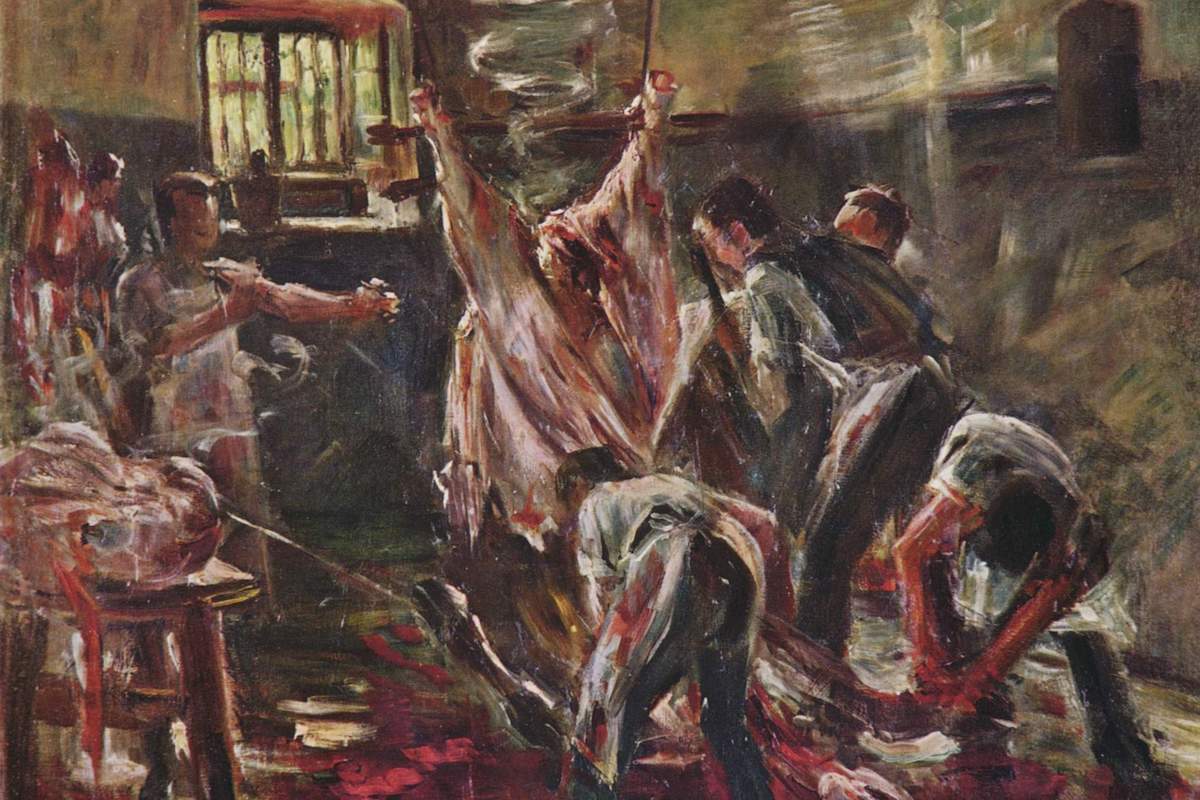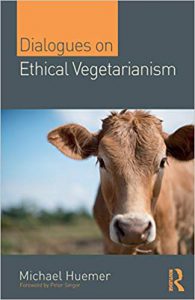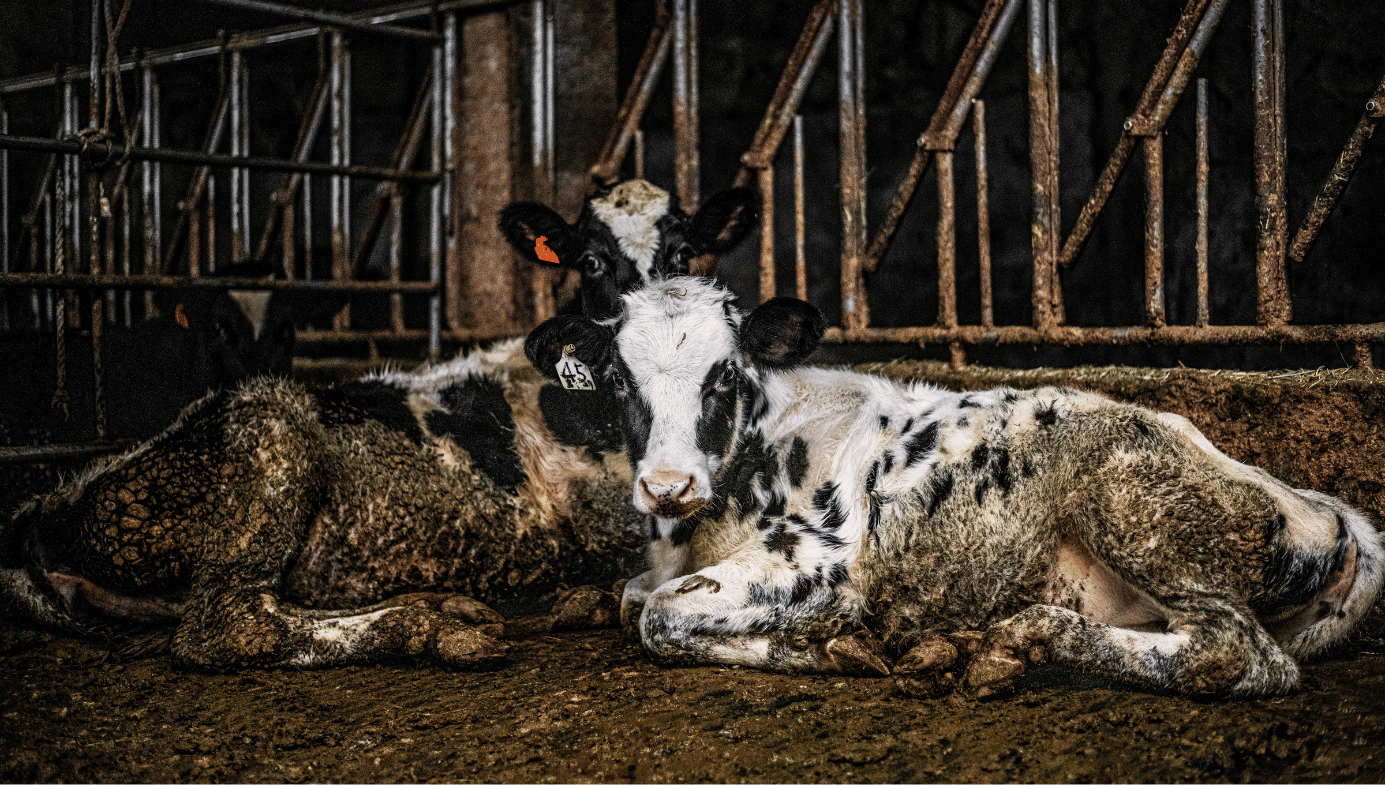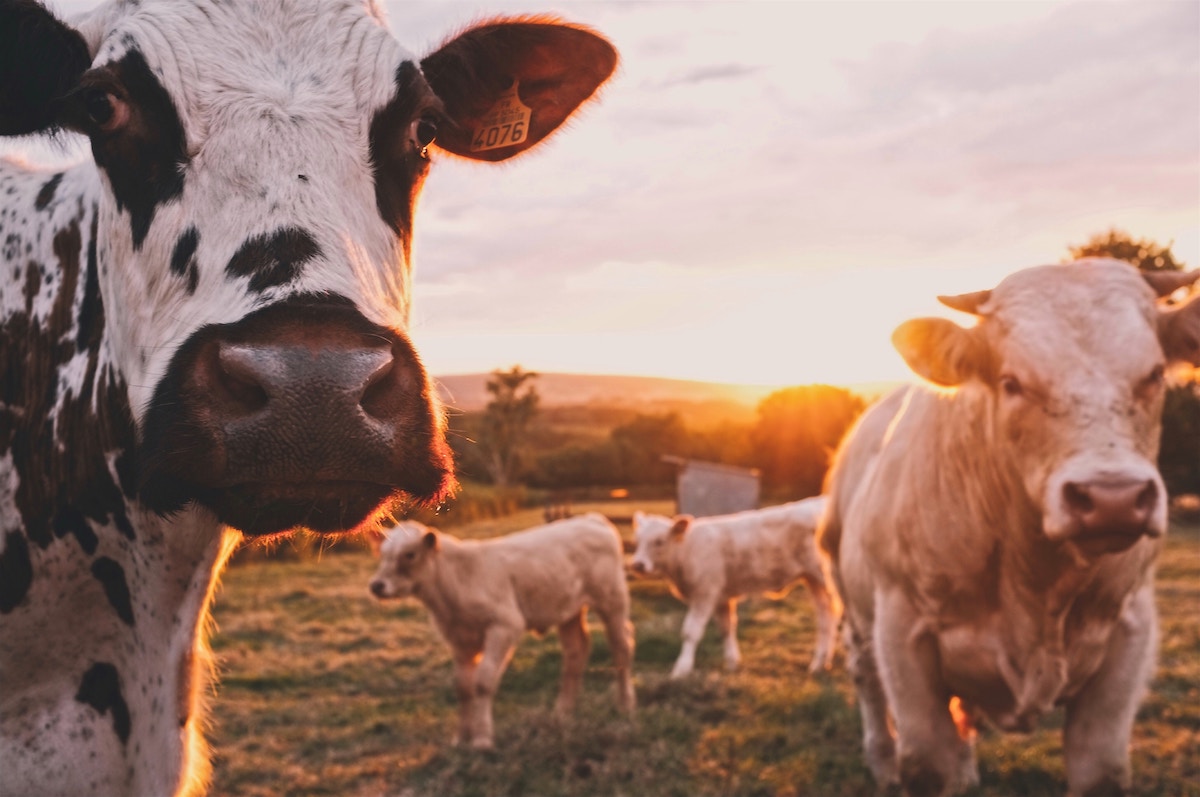Top Stories
The Libertarian Case for Rejecting Meat Consumption
The argument that avoiding meat would deny animals lives worth living faces further problems.

If George Orwell were alive today, he would troll vegetarians. In The Road to Wigan Pier (1937), Orwell described with exasperation how mere mention of the words “Socialism” or “Communism” seemed to attract “every fruit-juice drinker, nudist, sandal-wearer, sex-maniac, Quaker, ‘Nature Cure’ quack, pacifist, and feminist in England.” Orwell suggested that even this list did not include the flakiest leftists of all. And prominent among that group were those who ate no meat, a diet that Orwell associated with dreamy political projects such as the garden city movement, now forgotten, but which once sought to create urban areas ringed by greenbelts. “If only the sandals and pistachio-coloured shirts could be put in a pile and burnt, and every vegetarian, teetotaller and creeping Jesus sent home to Welwyn Garden City to do his yoga exercises quietly!”
Orwell was one of history’s greatest political writers, but on the subject of vegetarianism, he never got past stereotype. Anyone who has regularly eaten a meatless lunch in public knows that the image of vegetarians and vegans as members of the lunar Left has lived on well past Orwell’s time. (No, I don’t want to read your poem about Atlantis. Thanks, but I prefer not to hear about becoming a practicing shaman.) In reality, plant-based diets have long had right-wing adherents.
They include Henry Mark Holzer, who in the early 1970s was not only Ayn Rand’s lawyer, but an animal-rights advocate. Similarly, Matthew Scully had avoided meat for decades before he became a speechwriter for George W. Bush and then wrote Dominion: The Power of Man, the Suffering of Animals, and the Call to Mercy, which was warmly received by social conservatives. Now comes Michael Huemer, a distinguished University of Colorado academic, with what is (to my knowledge) the first book-length case against meat written by a libertarian, Dialogues on Ethical Vegetarianism.

Huemer’s book is a break from a long tradition of libertarian hostility to animal rights. As the political philosopher Jeremy Garrett has written, “not only have there been [few] libertarian defenses of animal rights…many libertarians seem to view their opposition to animal rights as directly entailed by their libertarianism.” Politics today provides many examples of leftists or liberals who view eating animals as inconsistent with their politics. They range from outgoing Labour Party Leader Jeremy Corbyn in the UK to former Democratic presidential candidate Cory Booker in the United States. Huemer has little sympathy for the politics of Corbyn or Booker, yet he clearly shares their opposition to meat-eating. How is this possible? How is it that representatives of conservatism, socialism, liberalism and now libertarianism, who disagree on so much else, can all agree that when it comes to eating a Big Mac, they’re not lovin’ it? As we will see, the answer to this question has implications far beyond our treatment of animals.
* * *
In The Nature of Morality, an introductory ethics text published in the 1970s, Princeton University philosopher Gilbert Harman included a vignette about coming around a corner to find some hoodlums setting fire to a cat. “You do not need to conclude that what they are doing is wrong; you do not need to figure anything out; you can see that it is wrong.” Harman chose this example because he knew few readers would condone incinerating a cat. When it comes to species we recognize as pets, our society has long viewed them as subjects of moral concern. This is evident not only in textbooks such as Harman’s, but in the lengths to which animal-rescue organizations now routinely go, such as finding adoptive homes for dogs from overseas.
If the moral concern our society bestows on animals is real, it is also very selective. Those we classify as food receive few rescues. Huemer lists some of the painful methods that are standard agricultural practices. “Chicken and pigs are commonly confined in tiny cages where they can’t move for their entire lives. Cows are branded with hot irons, to produce third degree burns on their skin. People cut off pigs’ tails without anesthetic,” Huemer writes. “They cut off the ends of chickens’ beaks, again without anesthetic. These tails and beaks are sensitive tissue, so it probably feels something like having a finger chopped off.” Orwell famously used the image of a boot stomping on a human face to symbolize a totalitarian future. Change the face to that of a pig and you have a good view of industrial agriculture.

Michael Huemer
The way we extend sympathy to some animals and cruelty to others seems an obvious contradiction. When it is pointed out, one possible response is to say, very well, to hell with cats and dogs—let them experience the same fate as pigs. Of course, this stance is not realistic: There is little chance of human beings ceasing to form bonds of affection, even love, with other animals. But the deeper problem with the bloody-minded response is that it achieves consistency at the price of cruelty: It would oblige us to accept lighting stray cats on fire. Even if we could stomach that, a consistent indifference to the suffering of other species would cast doubt on the moral status of some members of our own.
There are human beings with mental abilities more limited than those of farm animals. It is a sad fact that some homo sapiens are born with severe mental handicaps. Once we have abandoned all other species as unworthy of moral concern, the question arises as to why we should bestow such concern on human beings who will never possess the mental capabilities of ordinary human adults.
Philosophers use the term “personhood” to denote those capabilities: They include moral agency, rationality and language use. It is utterly uncontroversial to say that being a person in this sense is sufficient grounds to be worthy of moral consideration. But if so, what justifies extending moral concern to human beings who lack the attributes of personhood? In the jargon of moral theory, what gives them moral standing? If we are unmoved by the baseline sentience that these vulnerable human beings share with animals, what trait is left that can justify a concern with human beings who are sentient, and certainly individuals, but not persons in the above-described philosophical sense?
The philosopher Jan Narveson, who taught for many years at the University of Waterloo, thought he had an answer to this question. After animal rights became philosophically respectable in the 1970s, Narveson made it his mission to hunt down and kill the idea, on the grounds that animals were not persons. This view obliged him to say something about human beings who also lacked moral agency and other aspects of personhood.
“Marginal humans,” Narveson wrote in 1983, using a label that has not aged well, “are invariably members of families, or members of other groupings, which makes them the object of love and interest [on the part of] members of the moral community.” So Narveson concluded that merely sentient individuals had no inherent moral standing. But this was no big deal, he suggested, because we could count on their families to look after them.
Narveson’s argument relied on a false empirical premise. While it is true that most parents take a loving interest in their children, some do not. We are all too aware of horrifying figures such as Joseph Fritzl, the Austrian man who, between 1984 and 2008, trapped his daughter in a basement, where he fathered seven children with her through rape. When other paternal monsters make the headlines now, they are referred to as “the Irish Fritzl” or “the Italian Fritzl,” reflecting our tragic familiarity with extreme cases of parental abuse.
Restricting moral standing to persons would entail that unspeakable treatment of children by their family members be categorized as acceptable—so long as the victim is sufficiently mentally disabled. For if a human being truly lacks moral standing, and their fate is really in the hands of their caretakers, then others are stripped of grounds to object when those same caretakers become their torturers. Surely no account of moral standing is worth this price.
If views such as Narveson’s are unattractive, it is because they cannot do justice to the moral standing of sentient beings. The intuitive basis of this standing is obvious when we consider mentally handicapped humans and our strong commitment to their protection. But if sentience is enough to bestow these members of our own species with inherent moral standing, the same would also seem true of sentient animals.
This does not entail that animals are our moral equals. If there were only one space left in a lifeboat and I could save only a human being or a dog, all else being the same (the human is not a serial killer, and so on), it would be consistent with my argument to save the human person before the animal non-person. But even if sentience is not quite as morally significant as personhood, it is amply significant in its own right. Lifeboat cases force us to make a choice under tragic circumstances: they don’t justify putting animals in harm’s way as we currently do.
Sentience extends to cows, chickens, pigs and, according to much recent research, fish—effectively all vertebrates and a few stray non-vertebrates such as octopuses. These are beings with a consciousness that looks out onto the world. They experience pleasure and pain, bond with their young and pursue their own purposes, even if they are simple purposes such as seeking food, rest or affection. Yet while we marvel at these capacities in some species we subject others to an agricultural system that snuffs out their lives with mechanized indifference, even though nutritious plant foods are widely available. Once our capacity for ethical analysis is awakened, the practice of meat-eating, ancient and widespread though it is, is called into question.
* * *
Dialogues on Ethical Vegetarianism takes the form of a discussion between a meat-eater and a vegetarian (who, it turns out, is really a vegan). A primary goal of the book is to address arguments that frequently come up in debates over eating animals. “Most who are confronted with the issue deploy some form of distraction,” Huemer writes in the preface, “shifting attention to another issue in the vicinity without directly confronting the morality of their own behavior.” Examples of distraction include turning the conversation to some perceived hypocrisy on the part of proponents of plant-based eating (as though it would invalidate their argument); finding problems with the most extreme version of the animal-rights view; or shifting to hypothetical scenarios in which meat eating would be justified, without acknowledging how those scenarios differ from reality.
One defense of meat eating that is not a distraction appeals to the moral importance of species membership. The moral significance of being homo sapiens is sometimes mistakenly equated with the moral significance of personhood. The difference between the two is illustrated by again recalling human beings who never possess characteristics such as moral agency or full rationality. They are homo sapiens but not persons in the philosophical sense. If species membership itself is morally significant, the outline of a defense of meat-eating begins to emerge from the mist. We can in good conscience treat pigs differently than merely sentient human beings, simply in virtue of the fact that, while they are indeed sentient, they are not human.
This “speciesist” view is part of the moral common sense of our society: It is something we learn as children and are rarely encouraged to question. Yet despite its popularity, the speciesist view faces philosophical problems.
We don’t normally think that traits below the species level such as race and sex are inherently morally significant. If I am again in a lifeboat situation where all else is equal, and I justify my decision to rescue one person over another by saying “he is a man” or “she is white,” these justifications seem offensively wrong.
Of course there are views that hold we should give weight to race or sex as a way of taking into account the historic mistreatment of racial minorities or women. But we are considering a different idea: Whether race or sex have some intrinsic moral importance, one that would still hold true in an alternate universe where there was no history of racism or sexism. It seems obvious that race and sex, however relevant they may be in particular social contexts, have no intrinsic moral significance.
And when we shift our attention to taxonomic categories above the species level, they also seem morally irrelevant. It seems a matter of moral indifference for example what genus, family or order an organism belongs to. If all the other categories we use to classify human beings and other organisms have no inherent moral significance, is it really so crazy to say that the brute fact of species membership has no deep significance either?
To be sure, a being’s species normally coincides with traits that are morally significant. But what really seems to matter are the traits themselves, not the biological classification. If we were in one final lifeboat, this time in some strange science-fiction world in which we had to choose between a jellyfish-like creature that was somehow sentient and a dog-like creature that was not, it would be right to save the jellyfish. What matters in short are traits evident at the individual level such as sentience and personhood, not the biological categories into which we group living things.
Anyone who says this in public soon attracts villagers coming to burn them in the town square. (I hope my family can arrange for my stake to be reclaimed pine, which I’ve always thought looks nice.) And in fairness, the anti-speciesist view does have puzzling features. They include how it can (or cannot) justify a hands-off approach to the suffering animals experience in the wild. It seems unlikely that we want to arrange medevacs for every limping polar bear or dying whale. But we are still in the early days of working out a coherent animal ethic. And besides, a view does not need to be perfect to be compelling: It just needs to be better than the alternatives.
On the whole, anti-speciesism is more intellectually respectable than speciesism. A happy coincidence is that the anti-speciesist view seems to go hand in hand with an increased moral respect for human beings. As one summary of the psychology research puts it, “the evidence shows that the more sharply people distinguish between humans and animals, the more likely they are to dehumanize other humans,” such as women and immigrants. The common concern that an increased sympathy for animals entails less regard for human beings is not borne out.
* * *

Huemer’s book is unapologetically anti-speciesist. Even if previous writers have already made this case, a distinctive feature of Huemer’s text is that it addresses many popular defenses of meat eating. The dialogue format allows one character to put forward a familiar justification for the status quo, only for the other to challenge it.
One popular defense of omnivorism is that it is really in the animals’ own interest. “If the meat industry reduces its production, then farm animals won’t be better off; there will just be fewer of them,” Huemer’s meat eater says. “It’s better to have a low-quality life than not to live at all. So we’re doing future generations of animals a favor by eating animals today!”
The vegetarian character points out how difficult it is to reconcile this view with our moral thinking about persons. We don’t normally think that it is wrong to refrain from conceiving as many people as we could. Yet when the more-is-always-better view is taken to its logical conclusion, it suggests that a moral loss occurs when we turn down opportunities to increase the human population—surely an implausible conclusion.
The argument that avoiding meat would deny animals lives worth living faces further problems. One is that, contrary to what Huemer’s meat eater says, the lives of the vast majority of farmed animals are not merely of low quality—they are miserable, on account of all the branding, debeaking and isolating that Huemer describes. But even if humane farming were the norm, it seems unlikely that we would be doing wrong by failing to breed animals in maximal numbers. In the 1890s, New York City alone was home to 100,000 horses. No one ever claims that it is a moral tragedy that, thanks to the decline of carriages, we no longer raise as many horses as we once did.
A more recent defense of meat-consumption grants that it is wrong from a purely moral point of view. But, this defense holds, we are justified in continuing to support the meat industry, because it is going to keep slaughtering animals anyway. The industry is vast and often said to be insensitive to the purchasing decisions of individual consumers. So if I refrain from buying a chicken at the supermarket, this will have no effect on the overall output of factory farms. As the meat-eating character in Huemer’s book puts it, “if a wrong is going to be committed regardless of what we do, shouldn’t we make the most of it by taking whatever advantage can be gained from it?” If billions of chickens are going to die anyway, wouldn’t it be a shame to let all those drumsticks go to waste?
Huemer cites research by agricultural economists suggesting that the meat industry is in fact responsive to purchasing decisions of individual consumers, and so this defense again relies on a false empirical premise. On a more philosophical level, he notes how deeply unappealing the my-actions-make-no-difference rationale is when we apply it to human cases: “Say you live in Nazi Germany”—it isn’t hard to see where this is going, is it?—and “someone offers you a job helping load Jews into gas chambers for execution. It pays a little more than your current job. If you turn down the job, they’ll just get someone else to do it. Would you take the job?” Of course few readers would. But if the fact that our actions make no difference does not justify participating in the profound wrong to human beings, it is unclear how it can justify participating in the lesser but still serious wrong to animals.
The American politician Jesse Jackson once said that when it came to affirmative action, his message was, “mend it, don’t end it.” An increasingly popular view takes a similar approach to animal agriculture. Just so long as the animals are killed painlessly, agricultural reformers argue, our moral obligations will be met. Temple Grandin, the well-known slaughterhouse designer and spokesperson for people with autism, is perhaps the most prominent advocate of this view. A distinctive feature of Huemer’s book is that it goes beyond what Grandin and other reformers have called for, and urges us to end eating animals altogether.
One can accept Huemer’s argument, but still view the adoption of humane methods of slaughter as better than what we have now. But many defenses of humane slaughter go further, and portray it as the endpoint of our obligations to farmed animals. Such accounts often assume that it is possible to kill animals on an industrial scale without causing them to suffer, something that even Grandin has said is doubtful.
More deeply, humane slaughter takes no account of the interest animals have in avoiding a premature death. While Huemer’s case is primarily based on avoiding animal suffering, it seems clear from other contexts that the length of animals’ lives also matter. When it comes to pets, for example, we subject them to painful veterinary practices that extend their time with us, a practice that would make no sense if the only interest they had was in avoiding suffering.
Viewing humane slaughter as the morally best outcome, rather than a messy but achievable compromise, seems to have similarly odd implications, as critics have noted. If animals have an interest in avoiding pain but no similar interest in continued life, then we would do well to euthanize just as many animals as we can get our hands on—because that would prevent them from suffering without depriving them of anything of moral significance. In truth, our current agricultural system commits a double wrong, at the level of both suffering and killing.
Huemer’s dialogue suggests that the continued popularity of meat eating is in large part a result of social conformity. Our moral motivation is highly sensitive to what society considers acceptable. We prefer to go along with what everyone else is doing, rather than be ostracized as a moral extremist. In this way, the book shares something with previous investigations of our treatment of animals. “Is it not possible that future generations,” the novelist David Foster Wallace once asked, “will regard our own present agribusiness and eating practices in much the same way we now view Nero’s entertainments or Aztec sacrifices?”
Huemer is in the tradition of Wallace and other writers who reframe our perception of everyday meat eating. After being immersed in their work, barbeques and other social occasions that previously seemed anodyne, even wholesome, take on a ghoulish sheen. Practices that socialize children into meat eating—birthday parties, school luncheons, Happy Meals coming out the drive-thru window—go from innocent to eerie. Seeing the happiness on their little faces when the food arrives starts to feel like being in one of those literary works in which someone turns into a cockroach or a rhinoceros. Rather than name the horror, everyone goes smilingly on as before.
* * *
Huemer’s book presupposes no sympathy for libertarianism among his readers. A socialist could accept its central argument, given that it takes no stance on the scope of government or distributive justice. But Huemer’s interest in libertarianism is evident in a subtler way. Although the defenses of meat eating are presented by a fictional character, most are arguments that real people have made, and the footnotes reveal many of them to be proponents of small government or “anarcho-capitalism.” Huemer may have wanted to record the frequency with which his fellow libertarians have rationalized the status quo, or it could just be a coincidence. Either way, a welcome function of his book is to move beyond a disappointing deficiency in the libertarian tradition.
One representative of that tradition, philosopher Loren Lomasky, cites differences among species to justify our classification of some as food. As Lomasky puts it, “Oysters are low-risk, while dining on primates or dolphins is dubious.” Lomasky is appealing to a familiar hierarchy that exalts primates over chickens and other farmed animals. But this hierarchy is morally and empirically shakier than people think. As psychologist Lucia Regolin put it (in a paper with three co-authors), domestic chicks have “striking abilities to maintain working memories of the location of biologically attractive objects that parallel or outperform those of most mammals, including primates.”

Animal scientists Lesley Rogers and Gisela Kaplan go further in their book Comparative Vertebrate Cognition: Are Primates Superior to Non-Primates?. It summarizes findings that “challenge the concept that primates are special and even the view that the cognitive ability of apes is more advanced than that of non-primate mammals and birds.” Lomasky might do well to page through this book next time he is slurping down some oysters (which, admittedly, are gross to watch people eat, but otherwise morally fine).
A different problem is found in the work of Jan Narveson, the libertarian philosophy professor mentioned above in connection to the moral status, or lack thereof, of the severely mentally disabled. Narveson’s brand of libertarianism was influenced by a tradition of thought stretching back to Thomas Hobbes. It characterizes moral conventions as the outcome of a hypothetical contract between self-interested bargainers. I have an interest in respecting your rights if I can count on the same from you, so it makes sense for us to mutually abide by a social contract that rules out murder, theft and so on. So animals cannot have rights, because it makes no sense to imagine them agreeing to contracts, hypothetical or otherwise.
Narveson could never quite bring himself to face up to the full implications of his view in regard to human beings he considered “marginal.” Another neo-Hobbesian, David Gauthier, has been more forthcoming: “Animals, the unborn, the congenitally handicapped and defective fall beyond the pale of a morality tied to mutuality.” Gauthier’s words give off a whiff of sulphur. But the honesty, at least, is refreshing. There are no principled grounds on which to exclude animals from the protection of morality without also excluding many human beings.
Huemer is not the first libertarian to ever condemn meat eating. In his book Anarchy, State and Utopia (1974), arguably the defining masterpiece of 20th-century libertarianism, Robert Nozick wrote that “the extra benefits Americans today can gain from eating animals do not justify doing it. So we shouldn’t.” How can Huemer, like Nozick before him, reach this conclusion where other libertarians cannot? The answer has to do with a deep feature of modern political thought, one that touches on the nature of justice as it concerns not just animals but human beings.
Despite the intense combativeness of modern politics, there are some ideas that find proponents on both sides of the left-right divide. Prominent among these is the proposition that justice involves some minimal commitment to equality. Equality in this minimal sense does not refer to equality of resources, or talents, or any particular outcome. It rather refers to an abstract moral idea: Members of the political community should be treated with what Nozick termed “equal consideration.” In its dealings with us, the government must adhere not necessarily to equal treatment, but equal concern for our interests.
A political doctrine that cannot muster support for this moral principle fails a basic test of modern politics, of which history provides many pitiless examples. Fascism, Stalinism, slavery, widow-burning: Each invoked standards of justice that were fundamentally at odds with even a minimal commitment to the equal consideration of human interests. Each declared some group—Jews, kulaks, African-Americans, women—as unworthy of the same concern bestowed on “Aryans” or some other favoured in-group.
Huemer and Nozick share with mainstream conservatives, liberals and socialists a commitment to equal consideration. To be sure, they disagree with their political opponents over what equal consideration entails when it is fully kitted out with all the ancillary principles and empirical premises that make up a political philosophy. The Right has traditionally emphasized equality of opportunity while the Left has emphasized some degree of economic or resource equality. But as real as these differences are, the most compelling versions of both views share some conception of moral impartiality. Hence the image of an “egalitarian plateau” on which the different theories meet.
If different libertarians have taken different stances on the question of animal rights, one reason for this is because while some forms of libertarianism do occupy the egalitarian plateau, others do not. Narveson, for example, starts from a moral framework that rejects equal consideration in favour of self-interested bargaining. Lomasky is more committed to equality than Narveson, but is unable to recognize the interests farmed animals have, most obviously in not being killed, that are snuffed out by eating them.
This is how Huemer differs from Narveson, Ayn Rand and other egoistic libertarians. Like them, Huemer is not an economic egalitarian. But unlike them, he is a moral egalitarian. His account of justice appeals to impartial moral concern rather than pure self-interest. And this is why Huemer is able to mount a case for ethical vegetarianism that can be accepted by leftists, liberals and social conservatives, most mainstream versions of which now also occupy the egalitarian plateau. And this, finally, is why animal rights now finds adherents across the political spectrum. Representatives of libertarianism through socialism are increasingly extending the ecumenical standard of equal consideration beyond humans to other sentient beings.
The commitment that proponents of these diverse traditions share is not that animal and human interests are identical: No movement for voting rights for pigs is likely to appear anytime soon. It is rather that animals have interests of their own that deserve to be taken seriously, interests which political intellectuals, like society itself, are finally coming to recognize.
Anyone tempted by Orwell’s account today would thus get things backwards: The case for not eating animals ultimately depends not on values of the political fringe, but on a minimal commitment to unbiased moral consideration that now finds proponents within every respectable political philosophy. Future generations may wonder why it took not just libertarians, but all of us, so long to recognize this.
Andy Lamey is the author of Duty and The Beast: Should We Eat Meat in The Name of Animal Rights? (Cambridge University Press). He teaches philosophy at the University of California, San Diego.
Featured image: In the slaughterhouse, by Lovis Corinth, 1893.






